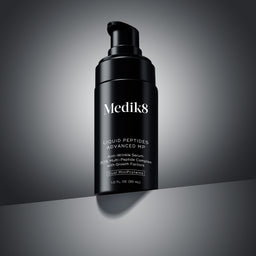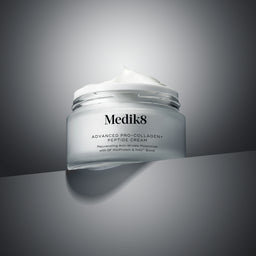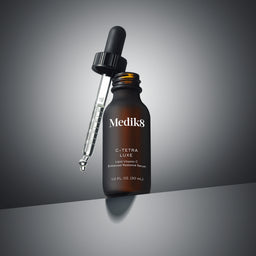Ceramides are essential lipids found naturally in the skin, and they play a vital role in keeping the skin barrier strong, resilient, and well-hydrated. These powerful molecules have become a cornerstone in modern skincare, especially for those looking to improve skin texture, reduce sensitivity, and restore overall balance. In this guide, we’ll take a closer look at what ceramides are, how they function, and why they matter for nearly every skin type. You’ll also find practical guidance on how to build them into your routine for long-term skin health.
For those ready to explore ceramide-rich formulas, browse our full collection of ceramide skincare products.
What Are Ceramides?
Ceramides are lipids, or fats, that occur naturally in the skin and make up a major part of the outermost layer of the epidermis. Often referred to as the “mortar” that holds the skin’s “bricks” (skin cells) together, ceramides help keep the skin barrier intact, smooth and resilient. Their role is both structural and functional, contributing to everything from hydration retention to protection against environmental stressors.
As skin is exposed to aging, external irritants or overuse of actives, its natural ceramide levels can decline. This loss contributes to dryness, irritation and an overall weakening of the barrier. Supporting the skin with topical ceramides helps to restore this balance, reinforcing what the skin naturally produces.
The Composition of Ceramides in the Skin
Ceramides account for approximately 50% of the skin’s lipids in the stratum corneum. They play a crucial role in sealing moisture into the skin while helping to keep external irritants out. This makes them essential not only for comfort but also for protecting skin from dryness, sensitivity and environmental stress.
When skin lacks sufficient ceramides, its barrier function can break down. This leads to visible signs of dehydration, rough texture and an increase in reactivity. Replenishing these lipids helps rebuild the natural defense system of the skin, making it more stable over time.
Importance of Ceramides in Skin Lipids
Alongside cholesterol and fatty acids, ceramides form a trio of essential lipids that support the skin’s barrier structure. Together, they work to maintain moisture levels, regulate permeability and influence how well skin defends itself against daily stressors.
This balance is delicate, and even a minor shift in ceramide levels can disrupt barrier integrity, leading to dryness or increased sensitivity. That’s why topical ceramides have become such a cornerstone in supportive skincare, especially for those with dry, aging or compromised skin.
Ceramides and Skin Health
Ceramides do more than moisturise the surface of the skin. They play an essential role in how the skin behaves, how it retains water, and how it responds to stress or damage. When ceramide levels are optimal, the skin barrier remains strong and resilient. When they decline, issues like dryness, irritation and visible sensitivity can quickly appear.
Ceramide Deficiency and Skin Conditions
When ceramide levels are low, the skin’s barrier becomes compromised. This allows water to escape more easily. This is a process known as transepidermal water loss, which allows irritants to enter more freely. Over time, this can lead to visibly dry, rough or reactive skin. People with conditions like eczema, psoriasis or chronically dry skin often show a measurable decrease in natural ceramide levels. Using ceramide-rich products can help support the skin’s ability to rebuild its protective barrier, making it more comfortable, less inflamed and better able to retain moisture.
Ceramides for Specific Skin Types
Ceramides are often associated with dry or sensitive skin, but they benefit all skin types. For dry skin, they help replenish lost lipids and restore comfort. For oily or combination skin, they help balance oil production and reduce the risk of barrier disruption from harsh treatments or over-cleansing.
In short, ceramides work behind the scenes to keep the skin barrier intact. No matter your skin type, adding ceramides to your routine can help maintain long-term skin stability and reduce reactivity.
Ceramides and Moisture Loss
A healthy skin barrier holds moisture in and keeps environmental stress out. When that barrier is damaged, moisture evaporates faster than the skin can replace it. Ceramides help to rebuild and strengthen the skin's barrier, making it easier for the skin to hold onto hydration.
Incorporating ceramides into your routine is one of the most effective ways to address moisture loss. They support the natural structure of the skin and help lock in water, which is essential for maintaining smoothness, elasticity and comfort.
Incorporating Ceramides in Skincare
Ceramides work best when used regularly, as part of a thoughtful and supportive skincare routine. Timing and consistency matter, as these lipids work well across a wide range of product types and can easily be included in both morning and evening routines.
Skincare Routine Incorporation
Ceramides can be found in a variety of products, including cleansers, moisturizers and targeted treatments. For best results, look for them in products specifically designed to support the skin barrier, particularly if your skin is prone to dryness, redness or sensitivity.
Start with a gentle cleanser that includes ceramides to avoid stripping away moisture. Follow with a serum or treatment containing complementary ingredients like hyaluronic acid or niacinamide. Finish with a moisturizer rich in ceramides to help lock in hydration and support the skin’s natural defences.
The Role of Ceramides in Anti-Aging Products
One of the less talked-about benefits of ceramides is their role in maintaining youthful-looking skin. As we age, the skin naturally produces fewer lipids, which can lead to dryness, fine lines and a loss of firmness. Ceramides help restore what the skin starts to lose over time. By reinforcing the skin’s barrier, ceramides help maintain hydration levels and support smoother, more resilient skin. This makes them a key ingredient in anti-aging products that focus on strengthening the skin from within rather than masking surface concerns.
Choosing the Right Ceramide Products
The best choice when choosing the best ceramide products depends on your skin’s needs, your texture preferences and how your routine is structured. Some formulas focus on replenishing moisture, while others are designed to support recovery after barrier disruption or irritation.
Ingredients That Complement Ceramides
Ceramides are most effective when used alongside ingredients that help draw moisture into the skin or strengthen the barrier further. Look for formulas that include:
-
Hyaluronic acid: Attracts and binds water within the skin.
-
Niacinamide: Supports barrier function and helps calm visible redness
-
Glycerin: A humectant that helps retain moisture and soften the skin
These ingredients work together with ceramides to help keep skin hydrated, balanced and resilient through everyday stress.
Expert Insights on Ceramides
Ceramides are widely used in skincare, with their effectiveness supported by strong clinical research and real-world experience from skin health professionals.* Dermatologists often recommend ceramide-rich products to patients dealing with dryness, sensitivity or barrier disruption. These expert perspectives highlight why ceramides are more than just a trending ingredient. They’re a foundational part of how healthy skin functions.
Dermatologists on Ceramide Benefits
Board-certified dermatologists often point to ceramides as one of the most important components in maintaining barrier integrity. Experts may agree that applying ceramides topically can help replenish what the skin naturally loses over time. When used consistently, ceramides contribute to smoother, more balanced skin that can better tolerate active ingredients and environmental changes.
Disclaimer:
*The information in this section is for general educational purposes only and does not constitute medical advice. While dermatologists often recommend ceramides for supporting skin barrier health, individual skincare needs may vary. Always consult a qualified healthcare professional or dermatologist before starting a new skincare product, especially if you have a diagnosed skin condition.
← Older Post Newer Post →







